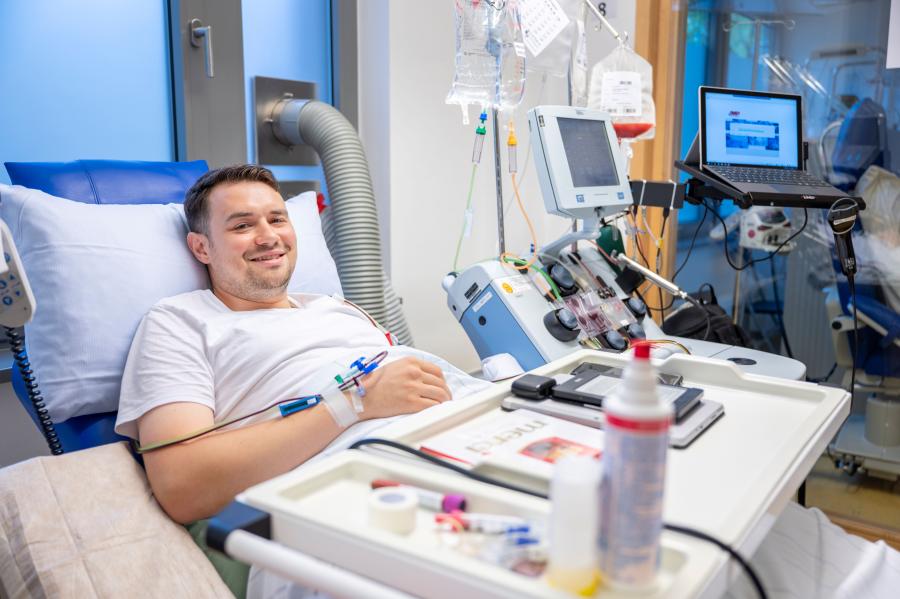Press Releases Archive
11.03.2024
Better contact increases stem cell donors’ availability
International researchers analyze world's largest donor registry data; donors more willing to donate when asked for a blood sample
Every year, more than 20,000 people in Germany die of blood cancer. It is the most common type of cancer in children. Donations of stem cells from blood or bone marrow increase the chance of survival for people suffering from leukemia and other forms of blood cancer. However, years may pass between the time a donor registers and the time he or she is called upon to donate. By then, many volunteers are reluctant to actually donate. An international team of researchers has now shown that regular contact with registered donors prior to donation significantly increases their willingness to donate. This effect is strongest when a blood sample is also requested.
The results have been published in the American Journal of Health Economics and provide important information to help donor registries worldwide improve their donor availability rates. Researchers from the University of Tübingen, Johns Hopkins University, the University of Technology Sydney, the Universities of Cologne and Essen-Duisburg as well as employees of the world's largest stem cell donor registry, DKMS, were involved in the study.
DKMS has a pool of more than 12 million potential donors in the USA, Germany, Poland, the UK, South Africa, Chile and India. The researchers analyzed a data set of 91,670 potential donors registered in the years 2013 to 2018 whose biological characteristics matched those of a patient with blood cancer. They were then asked again about their willingness to donate stem cells as part of the confirmatory typing process - one of the key steps on the path to stem cell donation. DKMS contacted some of these people with varying written requests asking for additional data or blood samples. For example, recipients were asked to update information on previous illnesses or to note stays abroad or pregnancies, which would have prevented a donation in an emergency. A subgroup was also asked to provide an additional blood sample for retyping in order to complete the genetic information. The other registered persons were not contacted again by DKMS for cost reasons; they formed the control group for the study.
When a blood sample was requested along with further information, the number of registered donors who were later reluctant to actually donate stem cells fell by 37 percent. "It's amazing that we were able to identify such positive effects despite the additional effort involved in taking a blood sample. The donors are reminded of their ability to help by being contacted again and they probably feel more motivated as a result," says Professor Patrick Kampkötter from the School of Business and Economics at the University of Tübingen, explaining the results of the study.
"At DKMS, we knew that every additional contact with potential donors during the study period was important - but not that the increase in their availability was so much higher. This finding has now been scientifically proven and evaluated, and every donor registry can consider whether the costs of the additional effort involved in making renewed contact are in proportion to the effect," says Dr. Dr. Alexander Schmidt, Chief Medical Officer at DMKS.
Unlike a simple blood donation, a stem cell donation requires a "genetic twin" to be found for the recipient. Twelve specific genes must match in the donor and recipient. Otherwise, the risk of a fatal immune response in the recipient is too strong. If a genetic twin has been found – if necessary, after a worldwide search - and the donor backs out or is unavailable due to travel or pregnancy, valuable time is lost in the search for another match. In that time, the chance of survival decreases for patients with blood cancer who urgently need suitable stem cells for their treatment. Being able to differentiate between the availability of donors in advance and to increase their motivation saves a donor registry valuable time.
A common ethnic origin between donors and recipients also increases the probability of a genetic match. Statistically, the willingness to donate differs considerably between ethnic groups. In Germany, 75 percent of those registered with DKMS are willing to donate in an emergency, whereas in the USA only half are willing on average, and among some ethnic groups such as African-Americans or Hispanics only around 30 percent. "Improving the availability of stem cell donors for donor registries in countries like the US is therefore of particularly great medical and economic benefit," says Prof. Mario Macis from Johns Hop-kins University in Baltimore, Maryland, USA.
Publication:
Michael Haylock; Patrick Kampkötter; Mario Macis; Jürgen Sauter, Susanne Seitz, Robert Slonim, Daniel Wiesen, Alexander H. Schmidt: Reducing Registry Members' Attrition When Invited to Donate: Evidence From a Large Stem Cell Registry. American Journal of Health Economics.https://doi.org/10.1086/730331
Contact:
Professor Dr. Patrick Kampkötter
University of Tübingen
Department of Managerial Accounting
07071-2973929
patrick.kampkoetterspam prevention@uni-tuebingen.de
Dr. Dr. Alexander Schmidt
Chief Medical Officer
DKMS Group gGmbH
07071-1743310712
schmidtspam prevention@dkms.de
Professor Mario Macis, PhD
Professor of Economics and Management
Johns Hopkins Carey Business School
mmacisspam prevention@jhu.edu
Contact for press:
Eberhard Karls Universität Tübingen
Public Relations Department
Dr. Karl Guido Rijkhoek
Director
Tilman Wörtz
Press Officer
Phone +49 7071 29-78622
Fax +49 7071 29-5566
tilman.woertzspam prevention@uni-tuebingen.de
All press releases by the University of Tübingen

